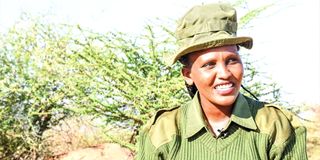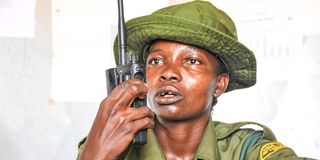Daring to dream: Samburu women come face to face with wildlife
What you need to know:
- Despite getting pregnant young and dropping out of school, Ms Lekumoisa Antonela’s dream of becoming a police officer wasn’t dimmed; she became a wildlife ranger at Meibae Conservancy.
- With women traditionally depicted as a weaker gender, Ms Antonela faced a huge task working in a team of men and on several occasions, sought company from Ms Celina Lelenguya, the first female radio operator at the conservancy.
Lekumoisa Antonela always wished to become a police officer. The young woman from Lengei village in Samburu East, is lucky to have set her foot in school in a county that is predominantly pastoralist. Here, education for girls is not given much value. Being in school, Ms Antonela was optimistic that she would realise her dream of becoming an officer.
The worst, however, happened when she got pregnant while in Class Eight and her parents withdrew their support, forcing her to drop out of school.
“I could not proceed to secondary school as my siblings and parents turned against me after I delivered. It was a low moment for me,” the fifth born in a family of nine recalls.
Having no one to rely on, she set out to look for casual jobs at hotels and shops in Wamba town to raise her son, earning a paltry Sh3,000 a month. She had tried offering laundry services, which earned her Sh400 a week before she eventually got employed at a local shop.
Unbowed, Ms Antonela still held hope that she would one day get back on track towards becoming the first woman in uniform from her village.
“I kept praying for a better opportunity and was hopeful that one day, my star would shine,” she tells The Voice.
What she now calls a miracle and God’s own timing came in 2015 when she was employed as a ranger at Meibae Community Wildlife Conservancy supported by the Northern Rangelands Trust (NRT), becoming the first female ranger at the conservancy at the age of 21 years.
Wild spaces
NRT supports communities to govern their wild spaces, identify and lead development projects, build sustainable economies linked to conservation, spearhead peace efforts to deal with conflicts.
With women traditionally depicted as a weaker gender, Ms Antonela faced a huge task working in a team of men and on several occasions, would seek company from Ms Celina Lelenguya who is the first female radio operator at the conservancy.
Many men, she says, thought she would not fit in the gruelling work of protecting and managing national parks and wildlife but she was ready to take the challenge to provide for her son and take care of her bills.
The rangers patrol the parks, monitor wildlife, avert poaching and help communities resolve human-wildlife conflicts while also engaging them in conservation efforts.
Over the years, competition over resources has triggered conflicts during dry seasons, posing major threat to communities and wildlife.
To avert the resource-based conflicts, community conservancies have spearheaded initiatives such as fodder production and clearing of invasive species.
“Men embraced me and supported me and I no longer feel misplaced being the only female in the rangers’ team,” Ms Antonela said in a past interview.

Ms Lekumoisa Antonela, the first female ranger at Meibae Community Wildlife Conservancy.
She has, on several occasions, been forced to remain in remote field locations for a long time, separating her from family for weeks. She has on other times gone for days without bathing due to lack of water in the remote areas.
She, however, never thought she would encounter a traumatising experience that affected her emotionally, making her consider quitting the job.
She had previously witnessed human-wildlife cases but the killing of three people by a jumbo in a span of a month early last year, broke her heart.
“An old woman was the first victim, followed by a child and a man, all in a month. I was so stressed I contemplated quitting,” says Ms Antonela who, is among the 50 women rangers across the 39 conservancies in Northern and Coastal Kenya.
The ranger had, for months, faced a difficult time calming irate members of the public who wanted to beat her up following the killing of a man by an elephant for ‘failing to enclose the animal in the park’.
An incident where one of her colleagues was swept by raging waters and his body found along sandy areas also disturbed her emotionally.
And while many say women are jealous seeing others excel, Ms Antonela says her journey could not have been possible without support from other women including her sister in-law, who took care of her nine-year-old son when she left for work. Her colleague, Ms Lelenguya, has also been instrumental in her career growth.
Male colleagues
“We (women) can achieve a lot if we support each other. Though many do not want to see their friends shine, there are a few good-hearted ones who care for each other,” she says.
With support from male colleagues, Ms Antonela has slowly built a strong heart and is more passionate of the work than before. She has also been able to support her siblings and family.
While Samburu traditions do not allow women to speak during men’s gatherings, Ms Antonela has by virtue of being a ranger, attracted respect and recognition from the community. She can now address gatherings though she has to be accompanied by an elder.
“Some years ago, people would run on seeing a female officer but with time, they have accepted me and can listen to me. I have also gained status in the community and society is slowly giving women a voice and space,” she notes.
“My family, that had abandoned me, is now proud of me and I have been supporting them.”
Her source of inspiration is her Grade Three son who she says ‘gives her strength’ to keep moving on, especially during her lowest moments.
For Lelenguya, 26, working at the conservancy’s radio room was unexpected as she wanted to become a teacher.

Ms Celina Lelenguya, the first female radio operator at Meibae Community Wildlife Conservancy. She monitors wildlife through technology to mitigate poaching and human-wildlife conflict.
But having no option after dropping out from college for lack of fees, she was ready to take the challenge of working in the male-dominated department.
“Elders initially opposed my employment and took some months before they accepted me. It gave me strength and encouragement that I could deliver like or better than men,” she says at the conservancy headquarters.
She has been working with Ms Antonela in wildlife monitoring to mitigate poaching and human-wildlife conflicts through technology.
The mapping is done through geo-location and helps track progress of wildlife population to know whether they are increasing or decreasing.
At a time when she was almost giving up on life, Ms Lelenguya besides getting the job, met her partner at the conservancy.
Communicating with rangers
Her work entails communicating with rangers in the field and helping deal with emerging issues and incidences.
She also provides advisory services to community in case of human-wildlife conflicts so that they take precaution.
On women taking up roles previously perceived as masculine, she says women can do better if given a chance.
Ms Antonela appeals to women to avoid being selective and seize any opportunities.
“Women should keep trying while supporting each other. Let them take advantage of any opportunity that comes their way,” she says.





